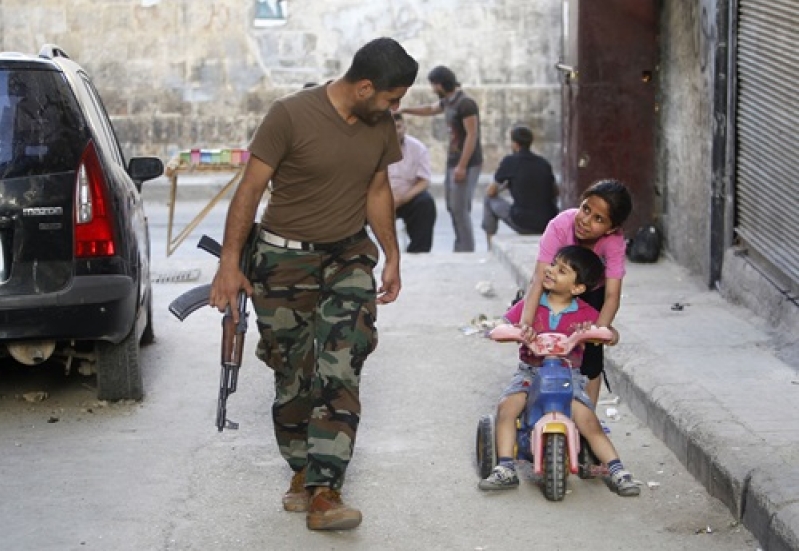
Amid UN’s report of at least 93,000 documented death toll in Syria, world leaders will convene next week in Ireland for the G-8 Summit, where the way to achieve a transitional government in Syria will be discussed, confirmed British Prime Minister David Cameron.
“What we want is not a continuation of conflict but what we want is a transition. We want to have a transitional government in which all of the Syrian people can have confidence,” Cameron told the Foreign Press Association.
“The only disagreement here politically in the UK, and I would argue probably across Europe, is how you get that transitional government. But I believe we’re taking the right steps.”
U.S. Secretary of State John Kerry and his British counterpart, William Hague, met in Washington Wednesday to discuss the situation. The meeting took place a day after Syrian rebels from the al-Qaeda-linked Nusra Front were accused of carrying out a sectarian massacre in which 60 Shia Muslim villagers were killed in Hatla, a settlement in the east of the country, the Telegraph reports.
On Wednesday night, Hague berated the Syrian president Bashar al-Assad for waging “a campaign of murder and tyranny” that threatened to destabilize the entire Middle East region, and called for further action to reach a political solution in the conflict.
“We will have to be prepared to do more to save lives, to pressure the Assad regime to negotiate seriously and to prevent the growth of extremism and terrorism if diplomatic efforts are going to succeed,” he said.
Although US officials had hoped to reach a decision this week on supplying arms to opponents of President Bashar Assad, there has been no announcement. The White House denied specific discussions were taking place, saying only that they were “constantly evaluating” the situation in Syria and that Obama wanted a “rigorous process” to assess whether to change US policy on the conflict.
According to Reuters, officials said that those closest to the president are split on the issue, as well as the possibility of more drastic steps such as using US airpower to ground Assad’s gunships and jets.
“Nobody wins in Syria the way things are going,” Kerry told reporters after meeting with Hague. “The people lose, and Syria as a country loses. And what we have been pushing for, all of us involved in this effort, is a political solution that ends the violence, saves Syria, stops the killing and destruction of the entire nation.”
According to the Telegraph, Kerry has spoken regularly since February about the need to change Assad’s calculation that he can win the war militarily, if only to get him into serious discussions with the opposition about establishing a transitional government.
Kerry said the danger is made worse by Assad’s allies Hezbollah and Iran and that the U.S. is focusing its efforts on supporting “the opposition as they work to change the balance on the ground.”
The White House, the Pentagon and the intelligence community remained hesitant about providing lethal support to a rebellion increasingly defined by extremists who, along with Assad, have turned a political insurrection into a sectarian war.
The U.S. Treasury Department decided on Wednesday to provide instead nonlethal support by easing restrictions on Syrian telecommunications, agricultural and petroleum transactions that benefit the opposition.
“We have refocused our efforts on figuring out what to do to help the opposition on the ground,” State Department spokeswoman Jen Psaki told reporters, citing Assad’s military success last week at Qusair as well as the influx of Lebanese Hezbollah and other foreign fighters as reasons for why the US was rethinking its approach.
Officials said the US, Britain and France, who together spearheaded the international intervention in Libya in 2011, were trying to coordinate a common approach before next week’s G-8 gathering. Russian President Vladimir Putin, Assad’s most powerful military and political backer, also will be present at the Northern Ireland summit.
On Tuesday, Putin contradicted the Syrian regime’s own characterization of the uprising as the work of foreign-backed “terrorists” in an address on the state-run Russia Today’s television station.
“Syria as a country was rife for some kind of change,” he said. “And the government of Syria should have felt that in due time and should have undertaken some reform.
“Had they done that, what we’re seeing in Syria today would have never happened.
Putin has previously appeared to back away from his support for Assad, raising hopes that he would be able to persuade Assad to step down and end the crisis. But Russia now seems determined to back him.
Putin said the intervention of the Western allies to reinforce the opposition armed forces would not work. “From the outside some people think that if you bring the entire region in compliance with someone’s specific idea of democracy, things will settle down and everything will be all right in that region,” he said. “But that’s not true.”
According to UN human rights reports, over 5,000 killings every month were documented since last July. The office of UN special representative on children in conflict, Leila Zerrougui, said it had received “verified reports that Syrian children are killed or injured in indiscriminate bombings, shot by snipers, used as human shields or victims of terror tactics.”






